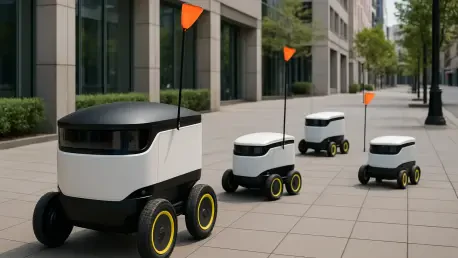In a striking development for the autonomous delivery sector, Serve Robotics Inc., a San Francisco-based innovator in sidewalk delivery robots, has captured significant market attention with a stock price increase of 28.63% on a recent Thursday, following the announcement of a multi-year partnership with DoorDash, a dominant player in the food delivery industry. This remarkable surge highlights the growing relevance of automation in addressing delivery challenges and positions both companies at the forefront of a rapidly evolving market. The collaboration promises to reshape last-mile logistics by integrating Serve’s cutting-edge robotic technology with DoorDash’s vast customer network. As urban areas become increasingly congested and consumer demand for faster, more efficient services rises, such partnerships could redefine how goods are transported in cities across the United States.
Strategic Alliance Shapes the Future
Expanding Operational Horizons
The partnership between Serve Robotics and DoorDash marks a pivotal moment for both entities as they aim to revolutionize delivery services starting in Los Angeles, with plans to extend to other U.S. cities through 2026. Under this agreement, Serve’s autonomous sidewalk robots will cater to DoorDash customers, enhancing the efficiency of last-mile delivery. This move builds on Serve’s existing collaboration with Uber and taps into DoorDash’s extensive market presence, potentially doubling Serve’s addressable market. CEO Ali Kashani has underscored the importance of this expansion, emphasizing that a growing fleet of over 1,000 third-generation robots—set to reach 2,000 by next year—requires a robust demand pipeline to maximize operational capacity. This strategic alignment not only boosts Serve’s visibility but also solidifies its role as a key innovator in urban delivery solutions, addressing the pressing need for scalable, automated systems in densely populated areas.
Enhancing Market Confidence
Beyond operational growth, this collaboration has ignited strong investor optimism, as evidenced by the significant stock rally for Serve Robotics. The 28.63% surge reflects broader confidence in the company’s ability to scale production and expand its footprint across major cities like Miami, Chicago, and Atlanta, where it already operates. Having completed over 100,000 deliveries with more than 2,500 restaurant partners, Serve has demonstrated a proven track record of reliability and efficiency. The partnership with DoorDash serves as a validation of Serve’s technology and business model, suggesting that investors see substantial long-term value in autonomous delivery solutions. This market enthusiasm also points to a potential resurgence of interest in automation technologies, especially as companies navigate the challenges of cost reduction and delivery speed in a competitive landscape. The financial boost could further enable Serve to innovate and refine its robotic fleet for even broader applications.
Trends in Delivery Automation
DoorDash’s Hybrid Delivery Vision
DoorDash’s commitment to a hybrid delivery model, blending human couriers with autonomous technologies, is a cornerstone of its strategy, and the partnership with Serve Robotics complements this vision seamlessly. The company has been actively investing in automation, notably through the development of its in-house robot, Dot, a sophisticated electric vehicle equipped with advanced sensors and a six-hour battery life. Capable of carrying up to 30 pounds at speeds reaching 20 mph, Dot exemplifies DoorDash’s push for efficiency and accessibility in urban delivery. Stanley Tang, head of DoorDash Labs, has articulated a goal of widespread deployment of such technologies to enhance service delivery. By integrating Serve’s sidewalk robots into its operations, DoorDash balances innovation with practicality, creating a versatile system that can adapt to diverse delivery scenarios while maintaining high service standards in a dynamic market environment.
Navigating a Competitive Landscape
The Serve-DoorDash alliance also unfolds against the backdrop of intensifying competition in last-mile logistics, where numerous players are vying to dominate the automation space. Companies like Alphabet’s Wing and Coco are developing comparable robotic and drone delivery systems, contributing to a crowded and fast-paced market. Serve Robotics stands out by scaling its sidewalk robots beyond niche applications, such as college campuses, into broader urban settings, positioning itself as a formidable contender. Industry experts, including Bern Grush of the Urban Robotics Foundation, highlight that the true challenge lies in software precision rather than hardware capabilities alone, pointing to the complexity of creating seamless autonomous solutions. Despite past setbacks in the sector—where major corporations have scaled back similar initiatives—this partnership signals a renewed belief in the viability of automation to transform delivery logistics over the long term.
Reflecting on a Transformative Milestone
A Catalyst for Industry Momentum
Looking back, the multi-year collaboration between Serve Robotics and DoorDash emerged as a defining moment in the delivery automation landscape, sparking significant market interest. The impressive stock surge of 28.63% for Serve Robotics mirrored the optimism surrounding its expanded operational footprint and the potential to meet escalating demand with an ever-growing robot fleet. For DoorDash, the partnership aligned perfectly with its strategic vision of integrating autonomous solutions alongside traditional couriers, enhancing both efficiency and accessibility. This alliance not only validated Serve’s technological advancements but also underscored DoorDash’s forward-thinking approach to hybrid delivery models. Amid a competitive and ever-shifting market, the collaboration stood as a testament to the enduring promise of automation in reshaping last-mile logistics, setting a precedent for future innovations.
Paving the Way for Future Innovations
As the dust settled on this landmark deal, the focus shifted to actionable next steps for sustaining momentum in autonomous delivery. Industry stakeholders began exploring how such partnerships could drive further investment in technologies that address urban delivery challenges, from traffic congestion to environmental impact. For Serve Robotics, scaling its fleet and refining software capabilities became critical priorities to maintain a competitive edge. Meanwhile, DoorDash’s hybrid model offered a blueprint for balancing innovation with reliability, potentially inspiring other companies to adopt similar strategies. The renewed interest in automation also prompted discussions on regulatory frameworks and public acceptance of robotic delivery systems. Moving forward, fostering collaboration between tech innovators and delivery platforms could unlock new efficiencies, ensuring that the transformative potential of this partnership continued to influence the broader logistics sector in meaningful ways.









